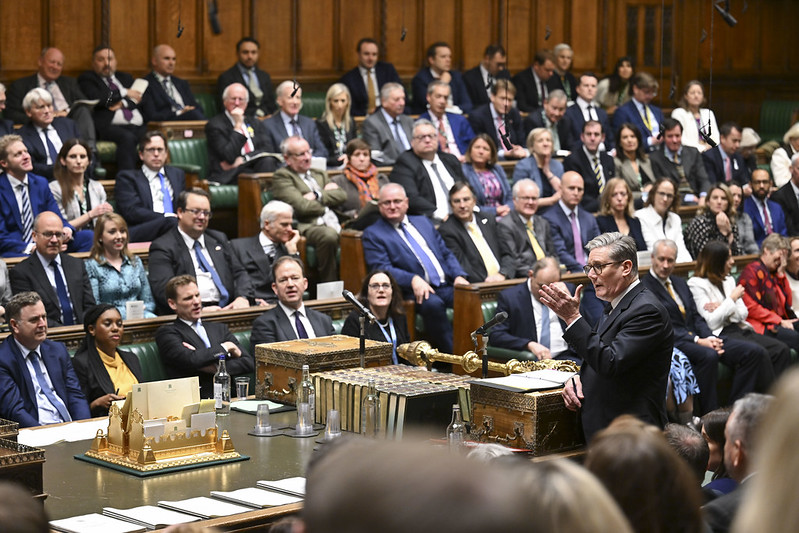
IMMIGRATION:
Sir Keir Starmer and Kemi Badenoch clashed over immigration policy this week. Last week, the Leader of The Opposition decided that she was “not asking about migration.” This week however, she decided that it was now a priority and that she did want to “talk about immigration.” While arguing over their record on immigration, two main policy points emerged. A deterrent, in the shape of the Rwanda scheme, and international cooperation to stop people trafficking. Both Labour and Conservatives clearly agree that something must be done to stop illegal immigration into the UK, but they have different plans to approach it.
The Tories planned to deter migrants from coming to the UK through the Rwanda scheme. Under the previous government, illegal immigrants were to be sent to Rwanda when they got to the UK and their asylum process would be carried out there.
The Rwanda scheme faced some major issues. The Supreme Court ruled that the plan broke the law by breaching the European Convention on Human Rights (ECHR). The Conservative government at the time could not guarantee the safety of the refugees in Rwanda, a further reason for the ruling.
It was revealed that only four people actually went to Rwanda, having gone on a voluntary basis, under a separate removal plan.
Labour immediately scrapped the “gimmick” when they got into office. So, what is the new approach?
Starmer wants to “smash the gangs that are running this vile trade.”
Deals have been struck with Iraq and Germany. The government wants to explain the realities of the dangers of coming to the UK to vulnerable people while also going after the criminals running the trade. Labour are aiming to stop the root cause of crossing the channel rather than just giving migrants a reason not come.
Kemi Badenoch still seems to believe that the Rwanda scheme will work but also believes that illegal migration is a real problem “[because] the numbers are going up.” Both parties agree that they want to do something about it, but they can’t agree on what.
SYRIA
The fall of the Assad regime was welcomed across the house. On the 8th of December 2024 Moscow confirmed that Assad had fled Syria, ending years of a brutal regime.
Almost 60,000 people were killed and tortured in prisons under the regime which fell last week. But what happens next?
Sir Ed Davey, Leader of the Liberal Democrats, was concerned with President-elect Donald Trump’s comments on Truth Social claiming that “The United States should have nothing to do with it.”
The Prime Minister highlighted that the UK is implementing “leadership that the right hon. Gentleman and the House would expect from this Government,” perhaps agreeing that the UK will have to step up in the face of preposed American isolationism.
One might wonder why events in Syria are important to the UK. The destabilisation of Syria breaks the Shia Crescent, a “land bridge” for Iran to project its power across Iraq, Syria and Lebanon to the Golan Heights, now mainly under Israeli control having pushed further into the Heights since the destabilisation in Syria.
MI5 have said that Iran poses a threat to peace in the UK, sighting 20 Iran-backed plots to harm UK citizens and residents since 2022.
Assad’s fall also signals a decline in Russia. Putin had propped up the regime in Syria but ultimately failed to keep it going under the joint stress of a war in Ukraine and Syrian rebels.
It is clear that what happens over there, matters here.
The government want to “ensure that this is peaceful, political and a rejection of terrorism and violence,” as a stable, peaceful Syria will benefit the UK.
2.5% ON DEFENCE SPENDING
The Member for Reigate asked if the government will achieve its target of 2.5% of GDP on defence spending. Amid the worsening state of the international order, how is the government meeting its pledge to increase spending to 2.5% of GDP?
2.5% is not a new target. The Johnson administration aimed to reach it by 2030. Truss aimed for 3% before quickly leaving. But Sunak quickly returned to Johnson’s pledge of 2.5% by 2030. It has long been clear that defence spending needs to increase but, we don’t seem to be doing it.
As a NATO member, we are obliged to spend at least 2% of GDP on defence. However, there have been repeated calls from senior officers to increase spending. Lord Dannatt, former Chief of the General Staff (the highest ranking officer in the armed forces), has said that 2.5% may not even be enough. Sir Patrick Sanders, another Chief of the General Staff, who studied at Exeter University, urged the new PM to commit to 2.5%.
There are even students at Exeter University who are effected by overall defence funding today. Members of Exeter University Officer Training Corps (EUOTC) have had to deal with cuts to funding over the past year. One former member of the EUOTC spoke to this publication about the merger with Bristol Officer Training Corps now becoming South West Officer Training Regiment (SWOTR). Current cuts to the funding of future officers are not disastrous to the armed forces but Exeter University does highlight the effects of the government’s cost-cutting measures.
Labour have committed to getting to 2.5% and have also begun a defence spending review to see where the money can best be used. But, in the meantime it seems clear that defence remains under funded.
Image: Sir Keir Starmer MP, The Prime Minister (Holborn and St Pancras, Labour), House of Commons, 2024 // CC BY-NC-ND 2.0



Average Rating